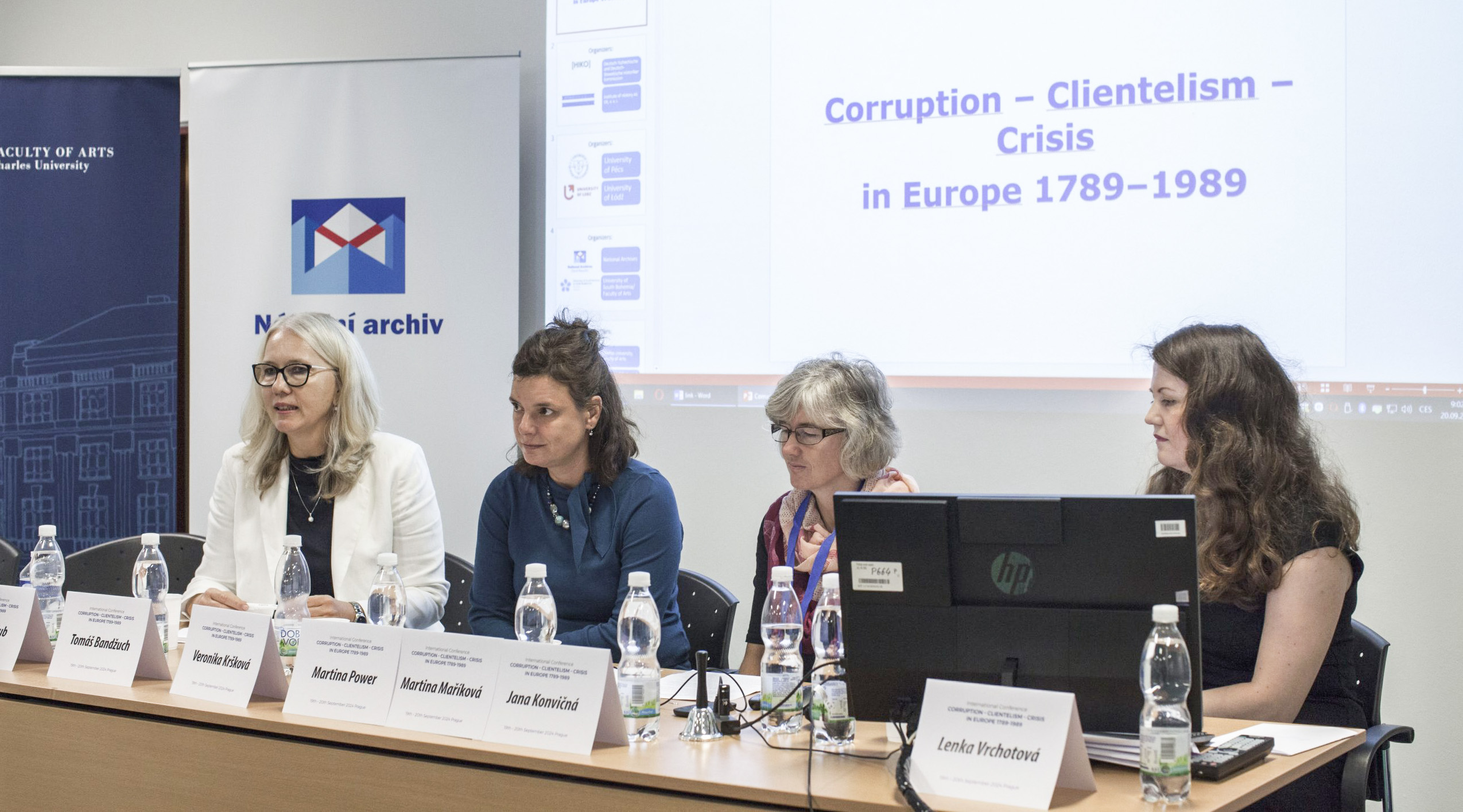Tisková zpráva
Ve dnech 19. a 20. září 2024 proběhla v prostorách Národního archivu mezinárodní konference „Korupce – klientelismus – krize v Evropě 1789–1989“.
Mezinárodním vědecké setkání připravil Historický ústav Akademie věd v. v. i ve spolupráci s Národním archivem.
Dalšími spoluorganizátory byl Ústav státu a práva Akademie věd ČR, v. v. i., Sociologický ústav AV ČR, v. v. i., Filozofická fakulta Univerzity Karlovy, Filozofická fakulta Jihočeské univerzity, Instytut Historii Uniwersytetu Łódzkiego, Pécsi Tudományegyetem, Deutsch-Tschechische und Deutsch-Slowakische Historische Kommission.
Mezinárodní konference vychází z výzkumného programu Strategie AV21 a sice projektu „Odolná společnost pro 21. století. Potenciály krize a efektivní transformace.“ V rámci tohoto programu se jednalo o v pořadí čtvrtou mezinárodní konferenci zkoumající různé aspekty odolnosti vůči různým druhům krize společnosti a státu.
V rámci vědeckého setkání zaznělo celkem 38 vybraných příspěvků od kolegyň a kolegů z České republiky, Slovenska, Kypru, Maďarska, Německa, Polska, Španělska a Ukrajiny, přičemž celá akce byla zhodnocena v závěrečném diskusním panelu. Vystoupení a následné zanícené diskuse přispěly k hlubšímu poznání komplexního a mnohovrstevnatého sociálního jevu, který umožňuje získávat a udržovat nelegální vliv, moc a majetek, který ale také může v krizových obdobích ohrožovat odolnost společenského systému.
Negativní fenomén korupce zkoumali badatelé interdisciplinárně a komparativně (zejména v historickém, sociálním, právním, ekonomickém, politologickém a kulturním kontextu). Setkání poukázalo na potenciál korupce poškodit demokratický systém zejména v okamžiku krize.
Přednesené příspěvky, které projdou recenzním řízením, budou publikovány v časopise Paginae historiae a vybrané texty v anglojazyčné kolektivní monografii.
Press release
On September 19 and 20, 2024, the international conference “Corruption – Clientelism – Crisis in Europe 1789–1989” took place in the premises of the National Archives. It was prepared by the Institute of History of the Academy of Sciences in cooperation with the National Archives.
Other co-organizers were the Institute of State and Law of the Academy of Sciences of the Czech Republic, the Institute of Sociology of the Academy of Sciences of the Czech Republic, the Faculty of Arts of the Charles University, the Faculty of Arts of the University of South Bohemia, the Instytut Historii Uniwersytetu Łódzkiego, Pécsi Tudományegyetem, Deutsch-Tschechische und Deutsch-Slowakische Historische Kommission.
The international conference was based on the research program Strategy AV21, namely the project “Resilient society for the 21st century. Potentials of crisis and effective transformation.” Within this program, it was the fourth consecutive international conference examining various aspects of resistance to various types of crisis of society and the state.
A total of 38 selected contributions from colleagues from the Czech Republic, Slovakia, Cyprus, Germany, Hungary, Poland, Spain and Ukraine were heard during the scientific meeting, while the entire event was evaluated in the final discussion panel. The performance and the subsequent passionate discussions contributed to a deeper understanding of a complex and multi-layered social phenomenon that makes it possible to gain and maintain illegal influence, power and property, but which can also threaten the resilience of the social system in times of crisis. Researchers have investigated the negative phenomenon of corruption in an interdisciplinary and comparative manner (especially in the historical, social, legal, economic, political science and cultural context). The meeting highlighted the potential of corruption to damage the democratic system, especially in times of crisis.
Papers presented that pass the review process will be published in the journal Paginae historiae and selected texts in an English-language collective monograph.
